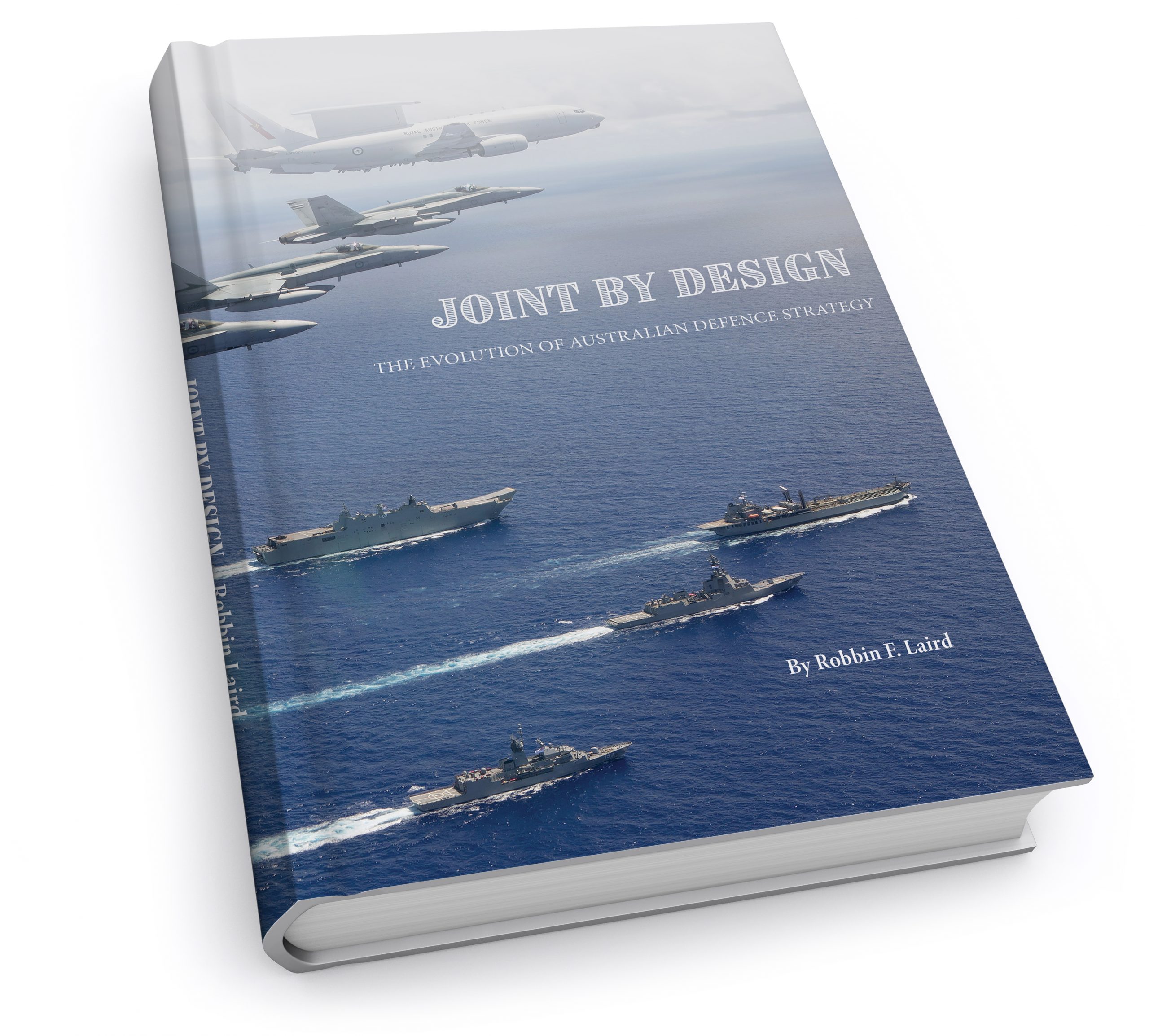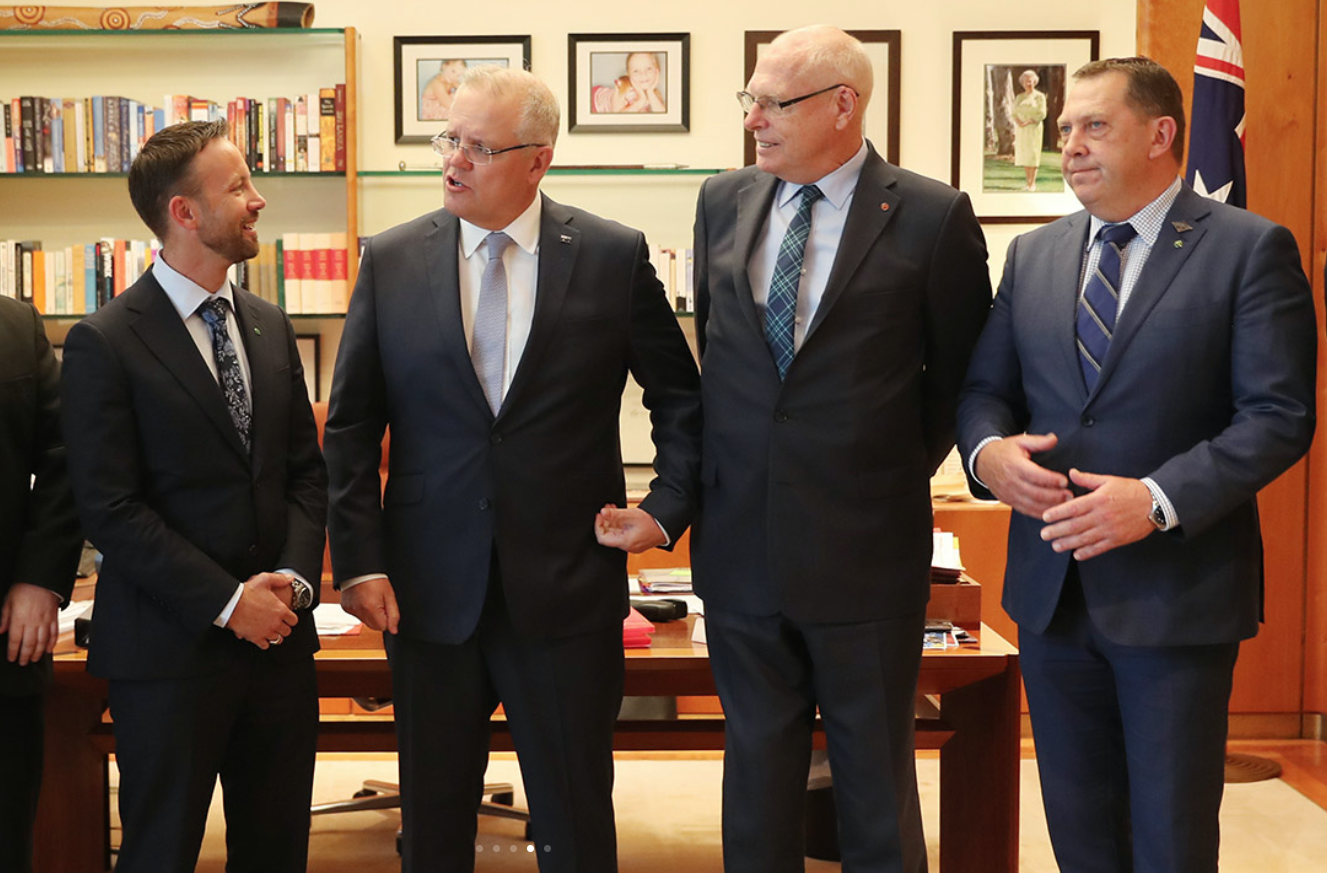By Robbin Laird
I am in the throes of finishing up my book on the evolution of Australian defence strategy over the past several years, from 2014 until now.
With the announcement of the new government defence strategy by Prime Minister Morrison on July 1, 2020, it seemed a good time to draw together the work I have done over the past several years in Australia.
The book provides a detailed narrative of the evolution over the past few years of how Australia got to the point where it currently is with regard to national defense.
Hopefully, the book will provide a helpful summary of that evolution. It is based on the Williams Foundation Seminars over this period, and highlights the insights provided by the practitioners of military art and strategy who have presented and participated in those seminars.
In that sense, this book provides a detailed look at the strategic trajectory from 2014 through 2020.
During my visits to Australia during this time, one of my interlocutors in discussing Australian and global developments has been Jim Molan, retired senior Australian Army officer and now a Senator. I have included in the book, the interviews I did with Senator Molan in the appendix to the book as a good look into the dynamics of change being undergone over the past few years.
Recently, Senator Molan has launched a podcast series looking at the way ahead and how Australia might address the challenges which its faces.
This is the third podcast in his series.
He starts each podcast with this introduction:
“Sun Tzu, the Chinese strategist tells us that strategy without tactics is the slowest route to victory.
“But tactics without strategy is just noise before defeat.
“My name is Jim Molan and welcome to our Noise Before Defeat podcast.”
Markets Produce Prosperity, Not Security
This podcast will look at why Australia is so vulnerable to a national security shock. And of course, we’ve just had an enormous one of those in the form of COVID and we’re still living through it. It’ll look at why Australia lacks self-reliance as a nation. And as a result, Australia is not prepared for an uncertain future that may involve conflict and war. Australia’s very sovereignty, our independence and perhaps our existence as a nation would be seriously threatened unless we start to prepare.
Well quite simply, I reckon there are five vulnerabilities. In essence, Australia is overly dependent on imports to run the nation. And as I say all the time, we’re not self reliant enough as we found out in COVID. We are overly dependent on one single market and the sea lines for exports and imports that make us prosperous. And China is using that against us now. In essence, Australia has a military developed for a different era and a different task. It’s very high quality. It’s the best that I have seen it in the 50 years that I’ve been exposed to the Australian military. It’s a fabulous base for development, but it’s incapable at its present size of defending the nation now or in the foreseeable future….
I suggest it goes a long way further than just the running shoes and t-shirts that we get from overseas because they’re cheap. We’re overly dependent on imports of manufactured goods and the import of information technology devices. We’re overly dependent on critical items, such as liquid fuels, fertilizer, pharmaceuticals, and many others. We need to import complex spare parts and industry. For example, the energy industry and the mining industry, defense items and spare parts and technical weapons such as missiles. And all of this could be denied to us by an increasing tension or by war. Liquid fuels for example, at the moment we import roughly 90% of our liquid fuels directly as crude oil or as a refined product. And where does it come from? One of the most unstable places in the world. It all comes from the Gulf, either as crude directly to Australia or as crude to other refiners in North Asia who then send it back to us.
We are totally vulnerable to that. But I do note that we have taken a major step forward very, very recently in that the minister for energy has started seriously to ensure that we keep our refining capability, and we start building reserves of liquid fuels in this country. Now, pharmaceuticals is another one that we should be worried about. 90% of our pharmaceuticals are imported. And during the initial stages of COVID, we did have some reserves and that was a great discovery that I was not aware of. We did have reserves in this country of pharmaceuticals, but we came close to running out in some areas. And of course, we saw recently some union bans on ports that are achieving exactly the same thing now. And that’s a real vulnerability for us….
It’s where we export it to and therein lies the problem. We are overly dependent on a single export market and that’s China. And if that was denied to us by one nation or by increases in regional tensions or actual war, our prosperity would drop significantly. Social tension would increase, our ability to fund recovery or adaption would decrease. And our ability for sustained defense would evaporate because we would run out of missiles and spare parts.
We don’t have a current comprehensive overall strategy. What the government of which I’m a part does brilliantly is solve problems one at a time. And even whilst working on COVID, I was blown away by the fact that the prime minister could come out and address a strategic update in terms of a defense strategy. And we’ve looked at cyber and we’ve looked at energy and we’ve looked at gas and we’ve looked at a vast range of things. It’s not as though we’re a one trick pony, but what I would say is that the basic thing that we must address is our self-reliance. And I use that term all the time. And in fact, everyone in government is using that term in relation to self-reliance because we’ve all realized it, but I think government and across the nation, that we need to be much more self-reliant.
Self-reliance I consider to be where a nation makes domestically what it needs for its security, but still buys everything else from the global market. Now, if you say that one particular thing is essential for us to be prepared to make in Australia, it doesn’t mean that you have to make all of it and you have to make it now. It does mean that you must be able to make enough of it. And then you buy the rest cheaper from overseas in Australia, so that if you have to expand at some stage when you are cut off from sea lines of communication, then you can actually do that. You have the technology and the base to expand and be self-reliant.
For the rest of it, until something happens, you can buy from overseas. In no way in the world am I ever suggesting that we back off from globalization. We just need to identify… And this is a job for government. We need to identify those items that are critical for us and how much we need to produce in Australia. So that in a certain period of time, when perhaps reserves that we’ve got run out, we are ready to produce much, much more.
If I look at the global market, I look at our inputs and I don’t care if we don’t have, as I said before, running shirts and running shoes, and t-shirts during a period of crisis. We don’t need them. But I do care if we cannot produce certain pharmaceuticals in Australia, or I do care if we can’t produce petroleum products in Australia. As a self-reliant nation, we must still be able to import and to export, we have just to identify across the nation, every single item that needs to be a bit produced in Australia and the time period that we need to have reserves in Australia of that particular item.
The Need for a National Security Strategy
Our national security system has no one organization responsible for developing national strategy. It doesn’t have this system to prepare our nation and it doesn’t have those professionals for advising the national leadership, particularly the prime minister during a serious ongoing crisis because we haven’t needed it in the past. And for 75 years, we haven’t had to do it.
We currently have a military not ready to go to war tomorrow. It could become much more prepared, relatively fast. And that’s the judgment that you’ve got to make, but that’s where the big money is. We need to examine that military and see whether its preparedness is high enough and what it would cost to raise that if we decided. But primarily it lacks serious and self-reliant lethality, mass and sustainability for the rapidly developing future.
And that military cannot in any way, defend this nation against the developing threats that most people agree are coming towards us now. I do acknowledge and I should to be fair acknowledge the extraordinary achievements within defense that the coalition government, since 2013 has embarked on particularly the shipbuilding programs, particularly the adequate resourcing of that military in order to provide the kind of military we’ve needed for the last 75 years. The point I make is that having done that, and it’s a great achievement and I personally thank them as someone who has a great love for our military. I personally thank our government, but now we need to look at the next step….
We should create a military that can defend the nation and support coalitions if we need to. And that military needs to be much stronger, much bigger and better supported so it can fight for longer. We need to create a government national security system, which is far more sophisticated and sophisticated enough to prepare us for conflict and a fast-moving war and manage 21st century crisis. And finally, realistically and publicly, we need to address the need for national security. And I can’t say it often enough. We must begin with a national security strategy to tie it all together.



